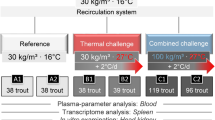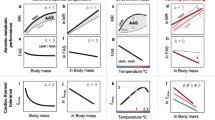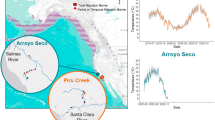Abstract
THE ultimate upper lethal temperature for roach, as defined by Fry1, is 33.5° C. These fish remain in good condition and all survive at 26° C. (for at least three months). At 30° C. roach lose condition and individuals die after a few weeks, while at 32° C. their condition deteriorates rapidly and individuals die within a week.
This is a preview of subscription content, access via your institution
Access options
Subscribe to this journal
Receive 51 print issues and online access
$199.00 per year
only $3.90 per issue
Buy this article
- Purchase on Springer Link
- Instant access to full article PDF
Prices may be subject to local taxes which are calculated during checkout
Similar content being viewed by others
References
Fry, F. E. J., Hart, J. S., and Walker, K. F., Univ. Toronto Stud. Biol., 54, Pub. Ontario Fish Research Lab., 66 (1946).
Fry, F. E. J., Brett, J. R., and Clawson, G. H., Rev. Canad. Biol., 1, 50 (1942).
Audige, P., C.R. Acad. Sci., Paris, 172, 282 (1921).
M'Gonigle, Trans. Amer. Fish. Soc., 62, 119 (1932).
Brown, M. E., J. Exp. Biol., 22, 118 (1946); 28, 473 (1951).
Gray, J., J. Exp. Biol., 6, 125 (1928). Wood, A. H., J. Exp. Biol., 9, 271 (1932).
Author information
Authors and Affiliations
Rights and permissions
About this article
Cite this article
COCKING, A. Relation between the Ultimate Upper Lethal Temperature and the Temperature-range for Good Health in the Roach (Rutilus rutilus). Nature 180, 661–662 (1957). https://doi.org/10.1038/180661a0
Issue Date:
DOI: https://doi.org/10.1038/180661a0
This article is cited by
Comments
By submitting a comment you agree to abide by our Terms and Community Guidelines. If you find something abusive or that does not comply with our terms or guidelines please flag it as inappropriate.



